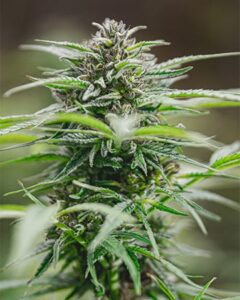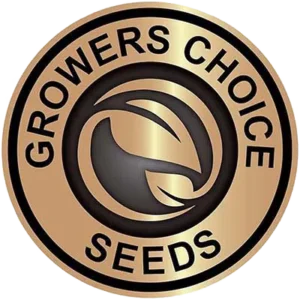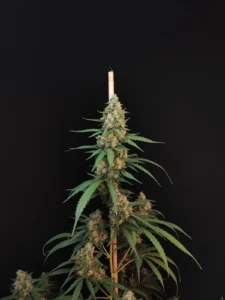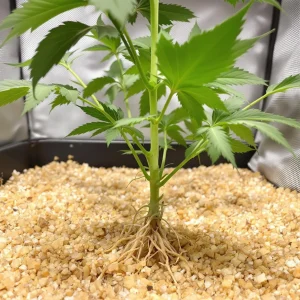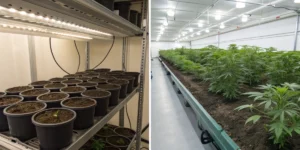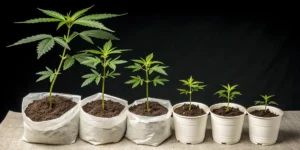Quick summary: Choosing the right hydroponic nutrients is essential for maximizing cannabis growth, yield, and plant health in soil-free systems. A balanced mix of macronutrients (NPK) and micronutrients, adjusted by growth stage and strain, ensures optimal nutrient uptake and prevents deficiencies. Beginners should start with pre-mixed solutions and monitor pH and EC levels consistently to maintain a stable and productive hydroponic environment.
Growing cannabis using hydroponics can be both rewarding and challenging. The best nutrients for hydroponics are crucial in ensuring your plants thrive. Hydroponic systems bypass soil, so you need to supply all the essential nutrients directly in the water. This method allows you to have complete control over what your cannabis plants consume.
Recommended Strains
Master Yoda Autoflower
|
|
THC | 25% - 28% (High) |
|
|
Lineage | (OG Kush x Master Kush) x Ruderalis |
|
|
Type | Autoflowering |
|
|
Height | 3.94 ft | 1.2 m |
|
|
Yield | Medium |
|
|
Yield Indoor | 1.31 oz/ft² | 400 g/m² |
|
|
Yield Outdoor | 15.87 oz/plant | 450 g/plant |
|
|
Life Cycle | 9 - 10 weeks |
|
|
Phenotype | 40% Indica / 60% Sativa |
|
|
Effects | Euphoric, Happy, Relaxed |
|
|
Flavors | Citrus, Pine, Sweet, Woody |
Ice
|
|
THC | 17% - 18% (Medium) |
|
|
Lineage | Afghan x Northern Light x Skunk |
|
|
Type | Feminized |
|
|
Height | 5.74 ft | 1.75 m |
|
|
Yield | Medium |
|
|
Yield Indoor | 1.31 - 1.47 oz/ft² | 400 - 450 g/m² |
|
|
Yield Outdoor | 17.64 - 19.4 oz/plant | 500 - 550 g/plant |
|
|
Flowering Time | 8 - 10 weeks |
|
|
Phenotype | 90% Indica / 10% Sativa |
|
|
Effects | Relaxed |
|
|
Flavors | Earthy, Mint, Pepper |
Selecting the right hydroponics nutrients cannabis plants require is one of the most critical decisions a grower can make. Because hydroponic systems eliminate soil as a nutrient buffer, every mineral must be delivered in precise concentrations to support vigorous growth and maximize yields.
When you’re just starting, it might feel overwhelming to choose the right nutrient mix. But fear not, with a bit of research and practical advice, you can create a nutrient-rich environment for your plants. Whether you’re a first-time cannabis seed buyer or a seasoned grower, understanding what your plants need is key.
Different strains have different needs. For instance, the OG Kush strain requires a slightly higher level of magnesium. On the other hand, the White Widow strain might benefit from increased phosphorus during flowering. Knowing these specifics can help tailor your nutrient solution for the best results.
Essential Nutrients for Hydroponic Systems
In any hydroponic setup, plants need a balanced diet of nutrients. These include macronutrients like nitrogen, phosphorus, and potassium, often referred to as NPK. Additionally, micronutrients such as calcium, magnesium, and iron play supportive roles in plant health.
Understanding how cannabis hydroponics nutrients function at a biochemical level allows growers to prevent deficiencies before they appear. Proper ratios of nitrogen, phosphorus, potassium, and trace minerals directly influence chlorophyll production, root expansion, and flower density.
Nitrogen is vital for leafy growth, phosphorus supports root and flower development, and potassium strengthens the overall plant structure. Micronutrients, while needed in smaller amounts, are just as critical. For example, magnesium is necessary for photosynthesis, while iron helps in chlorophyll production.
Knowing the function of each nutrient helps in crafting the perfect nutrient solution for your plants. The best nutrients for hydroponics provide a comprehensive balance that supports various plant functions, leading to robust growth and high yields. Tailoring your nutrient solution to meet the specific demands of your plants can be pivotal in achieving optimal results.
To further enhance plant health, consider supplements that bolster the availability of these essential nutrients for hydroponic systems. For instance, adding beneficial microbes can aid in nutrient absorption, improving overall plant vigor. Regularly testing and adjusting nutrient levels ensures that your plants receive the precise balance they need for flourishing growth.
Choosing the Best Hydroponic Nutrient Solution for Vegetables
When you’re also growing vegetables alongside cannabis, it’s important to choose a nutrient solution that supports both types of plants. The best hydroponic nutrient solution for vegetables will have a balanced NPK ratio, but it’s essential to ensure your cannabis plants also receive what they need.
Some solutions are specifically formulated for mixed gardens, containing all the essential nutrients for hydroponic systems. These solutions are practical for those who want to simplify their growing process. Make sure to adjust the concentration according to the specific needs of each plant type.
The best hydroponic nutrient solution for vegetables often includes additional micronutrients that cater to the diverse needs of various plants. This approach helps maintain a healthy ecosystem within your hydroponic setup, ensuring that all plants receive adequate nourishment. Monitoring the growth patterns of both cannabis and vegetables allows you to tweak the nutrient solution for balanced growth.
Consider using top-rated nutrients for hydroponic tomatoes if you are growing these alongside cannabis. Tomatoes can benefit from similar nutrient solutions, especially with slight tweaks to potassium levels. By observing plant responses and making necessary adjustments, you can maintain an optimal growing environment for your entire garden.
Organic Nutrients for Hydroponic Gardening
Many growers are turning to organic nutrients for hydroponic gardening. These nutrient solutions are derived from natural sources, making them a sustainable choice. They can be a bit trickier to manage, as organic materials can clog systems if not properly maintained.
Organic solutions often include fish emulsion, seaweed extract, and compost teas. These provide a broad spectrum of nutrients and beneficial microbes that can enhance plant health. However, careful monitoring is necessary to prevent issues like nutrient lockout or pH imbalances.
Organic nutrients for hydroponic gardening bring an added layer of sustainability and environmental responsibility to your growing practices. They offer a natural approach to plant nutrition, fostering a healthy root environment rich in beneficial microorganisms. When combined with the best nutrients for hydroponics, this natural synergy can lead to more resilient plants capable of withstanding various stressors.
While managing organic nutrients may require more diligence, the benefits often outweigh the challenges. By maintaining a balanced pH level and ensuring proper filtration, you can prevent common issues with organic nutrient systems. This approach not only supports plant health but also contributes to a more eco-friendly growing operation.
Comparative Table of Cannabis Strains Mentioned
| Strain | Type | THC Level | Nutrient Sensitivity | Key Hydroponic Consideration |
|---|---|---|---|---|
| Master Yoda Autoflower | Autoflower | 25–28% (High) | Moderate | Requires stable EC due to fast lifecycle |
| Ice | Feminized Hybrid | 17–18% (Medium) | Moderate | Balanced NPK during full cycle |
| OG Kush | Hybrid | High | Higher magnesium demand | Increase Mg in vegetative stage |
| White Widow | Balanced Hybrid | High | Higher phosphorus demand in bloom | Boost P during flowering |
| Northern Lights | Indica | Medium–High | Beginner-friendly | Stable feeder, ideal for nutrient learning |
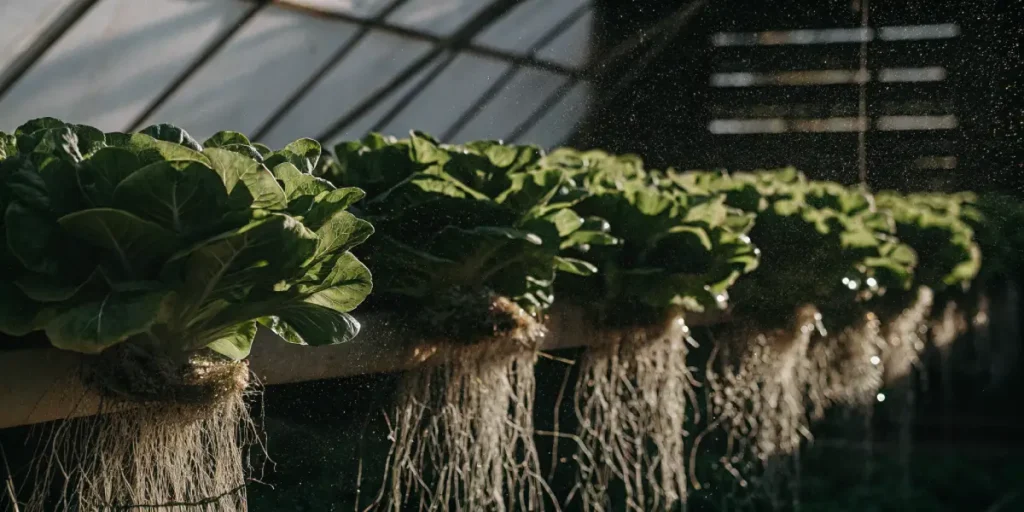
Hydroponic Nutrient Recommendations for Beginners
For those new to hydroponics, starting with a simple, pre-mixed nutrient solution is often the best approach. These solutions are designed to provide a balanced mix of essential nutrients, making them an ideal choice for beginners. They take the guesswork out of mixing and adjusting nutrient levels.
Choosing the right weed nutrients for hydroponics can simplify the learning curve for new growers. Pre-formulated nutrient lines designed specifically for cannabis help eliminate guesswork and reduce the risk of overfeeding or nutrient lockout.
It’s also wise to invest in a reliable pH and EC meter. Monitoring these levels ensures that your nutrient solution remains optimal for plant uptake. Beginners often overlook the importance of pH, leading to nutrient deficiencies even when the best nutrients for hydroponics are present.
Hydroponic nutrient recommendations for beginners often emphasize simplicity and ease of use. Opt for nutrient solutions that are user-friendly and require minimal adjustments. This allows you to focus on learning the nuances of hydroponic gardening without being overwhelmed by complex nutrient management.
As you gain experience, gradually experimenting with different nutrient solutions can enhance your understanding of plant needs. Starting with a forgiving strain, such as Northern Lights, helps you build confidence in your growing skills, setting the stage for more complex hydroponic systems in the future.
Practical Tips for Hydroponic Nutrient Management
Consistency is key in hydroponic gardening. Regularly change and replenish your nutrient solution to prevent imbalances. A general rule of thumb is to refresh your solution every two weeks, but this can vary based on plant growth and environmental conditions.
Keep an eye on your plants’ leaves, as they can tell you a lot about nutrient health. Yellowing leaves might indicate nitrogen deficiency, while purple stems can point to a lack of phosphorus. Adjust nutrient levels accordingly to address these issues promptly.
Developing a routine for nutrient management can greatly improve the health and yield of your hydroponic garden. Regularly scheduled nutrient changes, coupled with consistent monitoring, help prevent common issues like nutrient lockout and toxicity. This proactive approach ensures that your plants have access to the best nutrients for hydroponics at all times.
Incorporating top-rated nutrients for hydroponic tomatoes into your regimen can also benefit your other plants, as long as you fine-tune the nutrient concentrations to meet their specific needs. By staying observant and adaptable, you can maintain a thriving hydroponic system that consistently produces healthy plants.
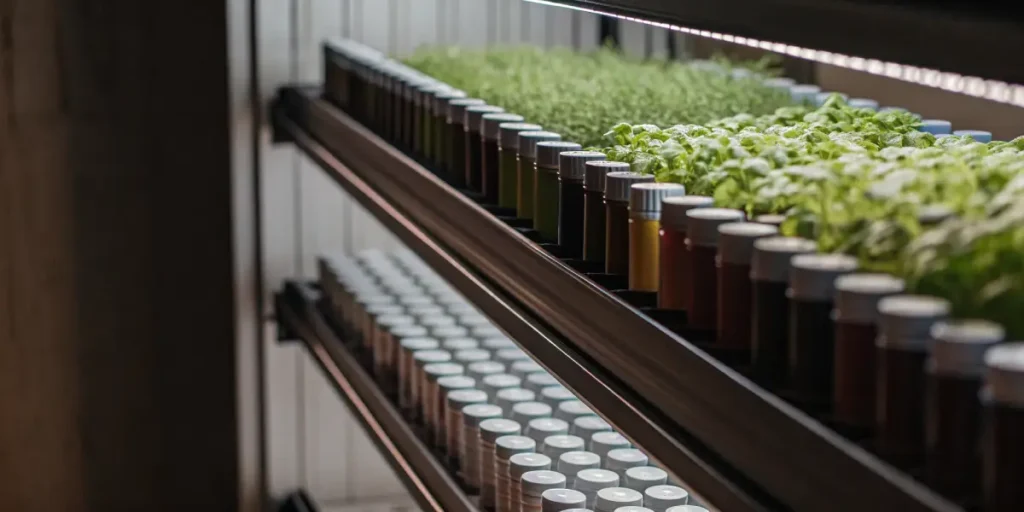
FAQs
What are the best nutrients for hydroponics?
The best nutrients for hydroponics include a balanced mix of macronutrients like nitrogen, phosphorus, and potassium, along with essential micronutrients such as calcium, magnesium, and iron. These nutrients are crucial for the healthy growth and development of your cannabis plants.
Choosing a nutrient solution that matches your specific plant needs is important. For instance, while growing cannabis, you might need to adjust nutrient levels during different growth stages. Always consider the specific requirements of the strains you are cultivating, such as OG Kush or White Widow.
The best nutrients for hydroponics are those that align with the specific growth phase of your plants. During the vegetative stage, a higher concentration of nitrogen may be beneficial, while flowering phases might require increased phosphorus and potassium. Tailoring your nutrient solution to these phases can significantly improve plant health and yield.
Utilizing a nutrient solution that provides comprehensive coverage of both macro and micronutrients helps prevent deficiencies and ensures robust plant development. By understanding the unique nutrient requirements of each strain, you can optimize your hydroponic system for maximum efficiency and productivity.
How do I choose the best hydroponic nutrient solution for vegetables?
When selecting a hydroponic nutrient solution for vegetables, look for a formula that supports a variety of plants. It’s important to ensure that the solution is well-balanced to provide all the necessary nutrients for both your vegetables and cannabis plants.
Many growers use a top-rated nutrient solution for hydroponic tomatoes, which often aligns well with the needs of cannabis. Adjust the nutrient concentration based on the specific requirements of your plants, and monitor their health for any signs of nutrient deficiency or excess.
The best hydroponic nutrient solution for vegetables should offer flexibility and adaptability to accommodate different plant species. These solutions often feature a balanced NPK ratio complemented by essential micronutrients to support a range of growth needs.
Observing plant responses to your nutrient solution is crucial in determining its effectiveness. Regularly assess plant health and make adjustments to nutrient concentration as necessary. This ongoing refinement process helps maintain an ideal growing environment for all plants in your system.
Are organic nutrients effective for hydroponic cannabis growing?
Yes, organic nutrients can be very effective for hydroponic cannabis growing. These nutrients are derived from natural sources and can provide a broad spectrum of essential nutrients and beneficial microbes. However, they require careful management to prevent issues like clogging and pH imbalances.
Using organic nutrients like fish emulsion or seaweed extract can enhance plant health and sustainability. Ensure that your hydroponic system is well-maintained to avoid potential problems and regularly monitor nutrient and pH levels for optimal results.
The use of organic nutrients in hydroponic cannabis growing is gaining popularity due to its environmental benefits and potential for enhancing plant quality. While they may require more careful management, organic nutrients can lead to healthier plants with a more natural growth profile.
To ensure the effectiveness of organic nutrients, maintain a clean and efficient system that prevents clogging and nutrient imbalances. Consistent monitoring and adjustments will help you harness the full potential of organic growing methods, leading to superior cannabis production.
What are some hydroponic nutrient recommendations for beginners?
Beginners should start with a simple, pre-mixed nutrient solution that provides a balanced mix of essential nutrients. These solutions make it easier to manage nutrient levels and reduce the risk of mistakes that can affect plant health.
Investing in tools like pH and EC meters is also recommended. These tools help monitor the nutrient solution’s pH and electrical conductivity, ensuring your plants receive the right nutrient balance. Starting with a resilient strain like Northern Lights can help beginners learn and adapt.
Hydroponic nutrient recommendations for beginners focus on ease of use and reliability. Pre-mixed solutions that require minimal adjustments are ideal for new growers, allowing them to focus on plant care and system management without the added complexity of custom nutrient mixing.
As beginners become more comfortable with the basics of hydroponics, exploring different nutrient solutions and monitoring their effects can provide valuable insights. This gradual learning approach helps build confidence and expertise, paving the way for more advanced growing techniques.
How do I manage hydroponic nutrient levels effectively?
Effective management of hydroponic nutrient levels involves regular monitoring and adjustments. Changing your nutrient solution every two weeks is a good practice, but this can vary based on plant growth and environmental factors.
Always pay attention to your plants’ appearance. Leaf discoloration and other visual cues can indicate nutrient imbalances. Adjust your nutrient solution accordingly to address any deficiencies or excesses, and keep your hydroponic system clean and well-maintained.
To effectively manage hydroponic nutrient levels, establish a routine that includes regular testing of pH and EC levels. This helps ensure that your nutrient solution remains within optimal ranges for plant uptake, preventing issues like nutrient lockout and toxicity.
Incorporating regular system maintenance and cleaning can prevent common problems associated with nutrient build-up. By staying attentive to plant health and promptly addressing any signs of stress, you can maintain a thriving hydroponic garden that consistently produces high-quality yields.




